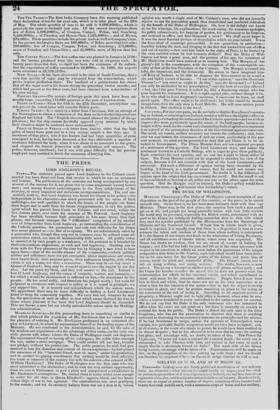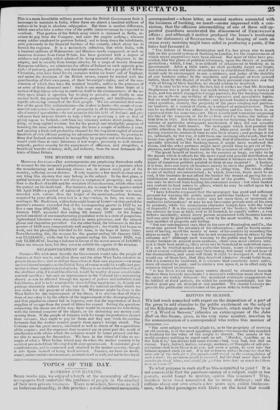IRELAND AS IT IS, AND AS IT MIGHT BE.
TIMES—On looking over the lately published distribution of our military force, we observed—what indeed we could hardly be unprepared for—that an enormous proportion of it was dispersed over Ireland, viz. not less than seven regiments of cavalry, and twenty-two entire battalions of infantry. Besides which, there arc an equal or greater number of depots, consisting of two hundred and twenty-four rank and file each, with a numerous corps of horse and foot artillery. This is a more formidable military power than the British Government finds it necessary to maintain in India, where there are almost a hundred millions of natives to be kept in absolute subjugation. But there is another difference, which men who take a sober view of the public interests cannot be expected to overlook. That portion of the British army which is stationed in India, re- ceives its pay from the Company, and costs the empire nothing ; whereas every soldier employed to garrison Ireland, and to keep down the inhabitants, adds grievously to the financial burdens of this country, which alone has to furnish the expence. It is a melancholy reflection, that while India, with a hundred millions of Mahometans and Hindoos newly conquered, at such an immense distance from Great Britain, has been governed with a degree of mildness and equality which admits of its being retained its allegiance to the empire, and in security from foreign attacks, by a corps of twenty thousand European soldiers, we administer the affairs of Ireland on such opposite prin- ciples of jealousy, partiality, and downright coercion, that a people of fellow- Christians, who have lived for six centuries within six hours' sail of England, and under the dominion of the British crown, cannot be trusted with the guardianship of their own peace, of their Sovereign's rights, and of the con- stitution of which they have the nominal benefits, unless in the presence of an army of thirty thousand men ! Such is one among the bitter fruits of a system of legislation refusing to conform itself to the circumstances of the so- ciety upon which it operates, but tending to provoke, and finally to arm against itself, the growing bulk of numbers, property, and intelligence,—the rapidly advancing strengffi Of the Irish people. We are astonished that some few of the great City arithmeticians—the dealers in funds—the scouts of com- mercial enterprise—the pioneers of prosperity in all its branches—the jacks ails of untried speculation—do not examine this fair field of Ireland, and pre- vail upon their truismy friends to help a little so promising a job as that of giving repose to Ireland,—not from any visionary notions about justice, libe- rality, or long-sighted wisdom, but for the prompt and intelligible purpose of lowering the army estimates, reducing the taxes a couple of millions a year, and opening a fresh and productive channel for the impatient capital of several hundreds of rich citizens panting for advantageous investments, by proving to them that Ireland, maintained in tranquillity by popular and wholesome laws. would yield them at once labourers at low wages, proximity to well situated outposts, perfect security for the enjoyments of affluence, and, altogether, a beneficial transfer of money, skill, and industry, from the most fortunate dis- tricts of Great Britain.



















 Previous page
Previous page